A Chinese man in his mid-twenties sits slouched behind a wobbly-legged table at the casino entrance, playing a game on his smartphone.
The casino isn’t large, but what it lacks in size it makes up for in strangled opulence. The beige stucco facade is thick with gold filigree, mirrored windows and a glowing sign, written in towering Chinese characters, announcing: “The God of Wealth Company International”.
The makeshift casino is not listed on Google Maps; it is meant to be found only by those who know where to look, down a dark road in the heart of Sihanoukville on the Cambodian coast. A cursory Google search reveals that the casino has developed quite a reputation despite its lack of official listing: “You don’t want to mess up here”, one writer warns on an open forum. “If you’re good, good things will come to you. If not…”. His epithet for the casino, the “God of Wrath”, finishes his sentence for him.
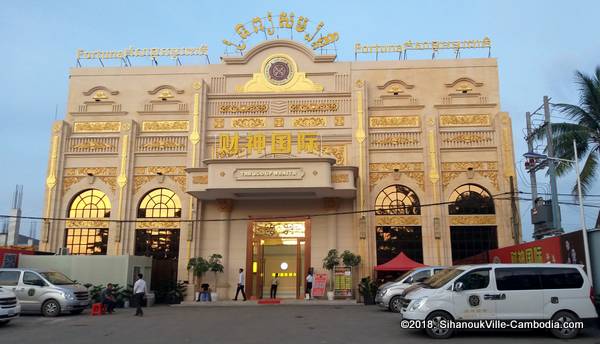
The guard jolts out of his plastic chair when he sees someone out of place – a westerner – preparing to walk past him onto the casino floor. He calls out over his shoulder in Mandarin, wary eyes following the newcomer as he trails close behind.
The interior is drenched in plastic chandeliers, imitation antique chairs and faux-marble columns. Casino dealers and cleaning crew alike look up, puzzled. One gambler pauses his game of baccarat to open a translator app on his phone, his rapid Mandarin rewritten as rough English held in his hand: “They want you say why you here”.
After a tense few minutes, the young guard escorts the newcomer back to the front door. He makes it clear that there is no place for the western visitor to play on the casino floor – strangely vacant though it may be.
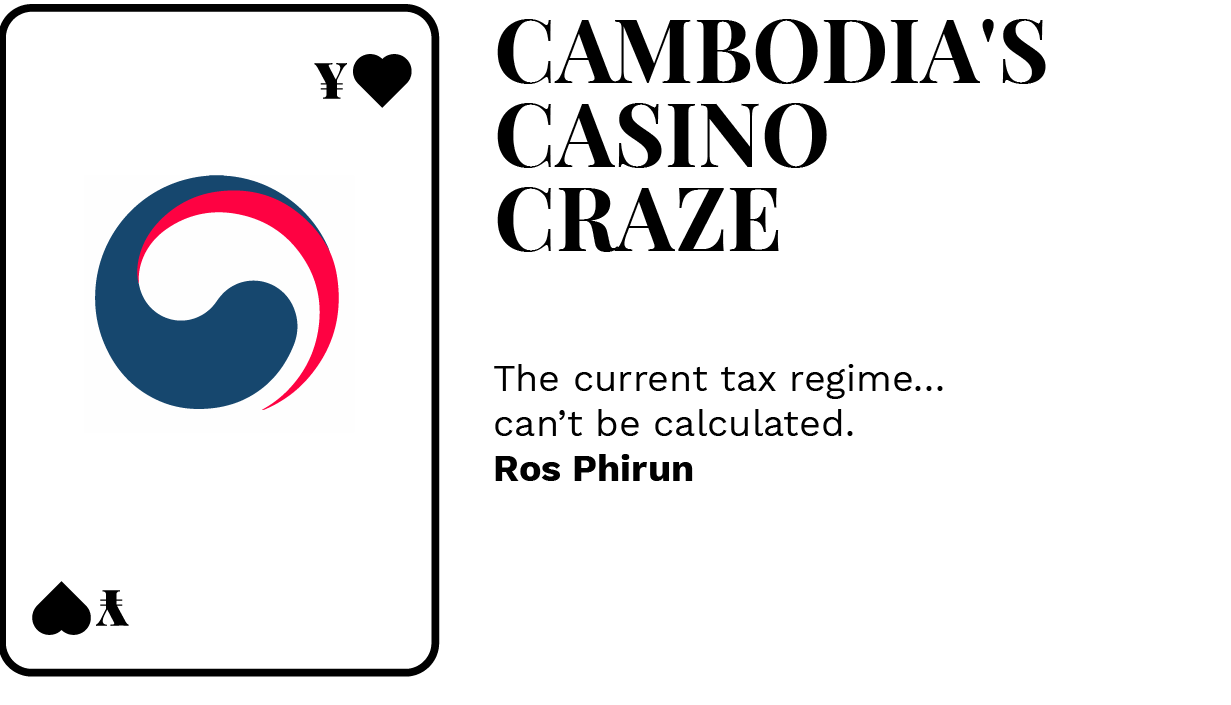
It is a scene that plays out often in Cambodia’s seaside city of Sihanoukville, where dozens of casinos – many of which are Chinese owned and operated, and which cater primarily to a Chinese audience – have grown like weeds from the sandy soil, displacing hundreds of local businesses and residences.
In 2015, Ros Phirun, the spokesman for the gaming and casino department at the Ministry of Economy and Finance (MEF), was quoted as saying that the casino industry in Sihanoukville was “nearly nonexistent”. Four years on, it’s hard to imagine a version of the city devoid of the dozens of gambling halls that line the city centre’s roads.
By the end of last year, the number of licensed casinos across the entire Kingdom had risen from 63 in 2015 to a staggering 138. Of that total, 88 licensed casinos are based in Preah Sihanouk province, and 38 are located in the capital of Sihanoukville itself.
In addition to these, dozens of casinos blatantly operate outside of the law, seemingly unwilling – and unpressed – to pay the $40,000 annual casino licensing fees. A map of the province, well-circulated on open forums and various local gambling websites, is dotted with the locations of 100 casinos along the Preah Sihanouk provincial coast, with roughly 80 based in the heart of the city. Gone are the days of gambling halls hidden in the basements of hotels and restaurants; now illegal casinos operate from multi-storey buildings and raise gilded signs – as the God of Wealth Casino has done – seemingly without fear of legal action.
But the rise of the shadow casino is not the only issue Cambodia faces; even the Kingdom’s casinos that meet every legal requirement set for them have proven problematic.
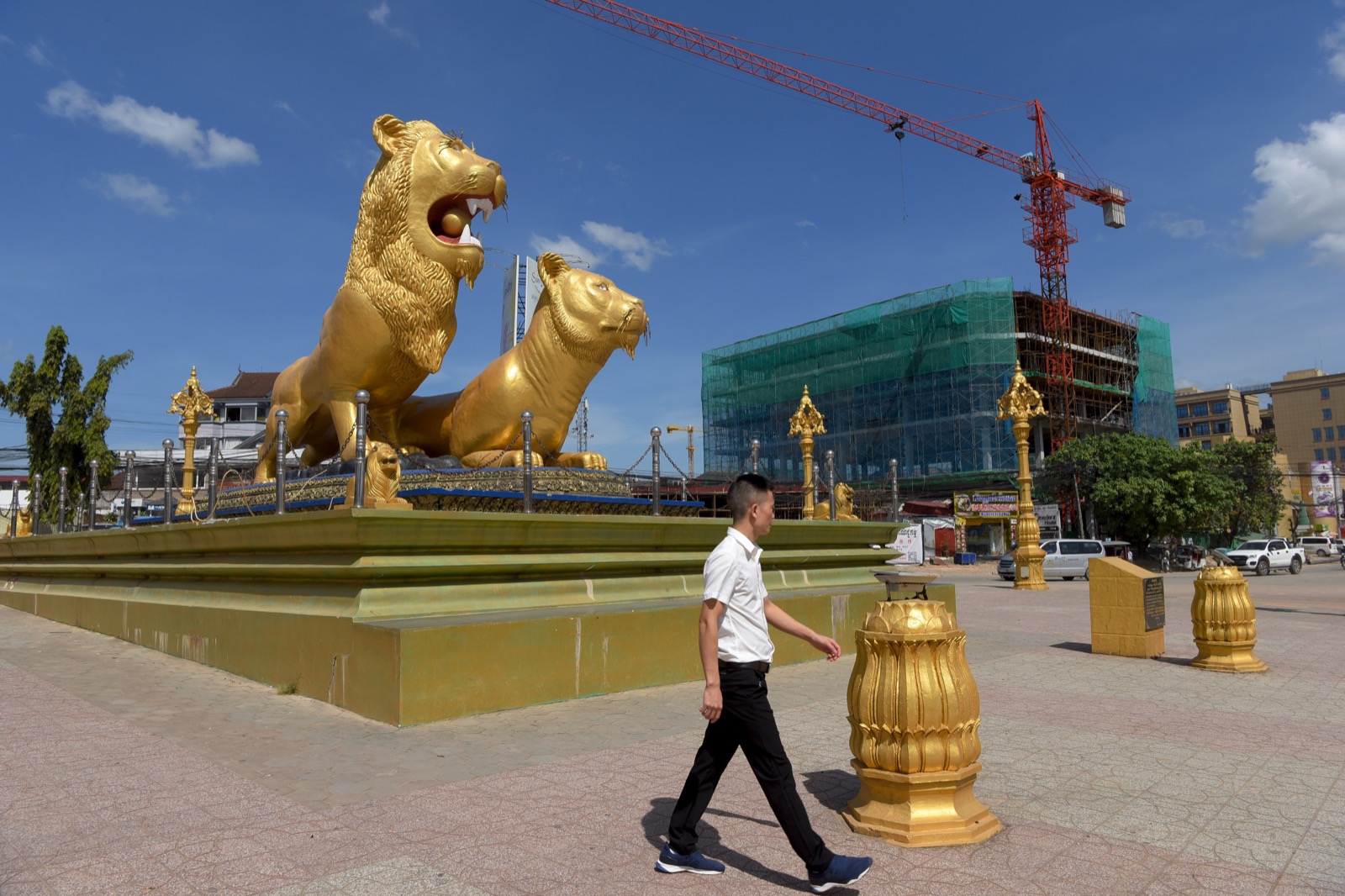
A common complaint that has risen from the displaced people of Sihanoukville is that Cambodia’s casinos are not benefitting the local communities in which they are based. While both licensed and unlicensed casinos attract foreign visitors, it has been argued that the tourists that casinos attract rarely spend their money at locally owned businesses. And no matter where you are in the world, where casinos go, rising crime rates follow.
The main way that casinos can positively impact Cambodia, then, is through their direct monetary contribution to the Kingdom – preferably paid in hefty taxes.
But despite booming business, Cambodia’s casinos aren’t paying their fair share there either. Although the total number of licensed casinos in the country has risen by nearly 120% in four years, the amount of money generated in taxes has gone up by barely a third.
In 2018, a total of $46 million was paid in taxes to the MEF – $12.4 million of which was paid by publicly listed casinos NagaWorld and Donaco, which together raked in just under $1.5 billion in gross gaming revenue (GGR) over the course of the year. The rest of Cambodia’s casinos chipped in to pay the remaining $33.6 million to the MEF, each paying on average just about $260,000 in taxes.
In contrast, the gambling city of Macau – home to 41 casinos which, in 2018, raked in $37.4 billion in GGR – saw the benefit of $13.21 billion in taxes from its gaming industry last year, taxing its casinos at an effective tax rate of 39%. It is impossible to estimate how much Cambodia would make if it were to tax its casinos’ GGR at the same rate – there is currently no estimate, official or unofficial, of the total gaming revenue earned at the 138 legitimate casinos scattered across the country.
Four years after dismissing the Sihanoukville gambling scene as “nonexistent”, Phirun tried to explain how the MEF has responded to the rapid rise in casino activity across the country, but struggled to define how the ministry has thus far addressed taxing these new businesses.
“The current tax regime… can’t be calculated,” Phirun told Southeast Asia Globe in a recent interview. “It’s just based on the annual budget law and some other factors [such as location, casino size and number of players]… so we assume based on lump sum method.”
It is an answer that Phirun has given for years: though casinos are allegedly paying monthly installments to the government, the MEF cannot or will not define exactly how it determines the rate at which each licensed casino is taxed. There is no defined “lump sum method”. And there is no transparency; unless the casinos themselves choose to report the amount they have paid in taxes, as the handful of publicly listed casinos in the country are required to do, the information is not publicly available.
The hand Cambodia has been dealt



The problem isn’t necessarily that Cambodia’s licensed casinos are acting illegally or working some loophole that allows them to pay minimal tax. The problem is that Cambodia doesn’t have a universal tax law for its casino and gaming sector.
It never has.
“We don’t have a tax law on gaming yet,” Phirun explained. “But I expect the [new gaming] law will come into effect in 2020.”
The expected law, he added, will tax casinos on the basis of their overall GGR, as is common practice. Despite alleging that the law will pass within the year, however, Phirun said that particulars of the new law remain to be determined. He did not reveal how much of a percentage of total GGR casinos would be required to pay – though prior drafts of the law had reportedly set the tax rate as low as 4% to 5%, which would make Cambodia’s casinos among the least taxed in the world.
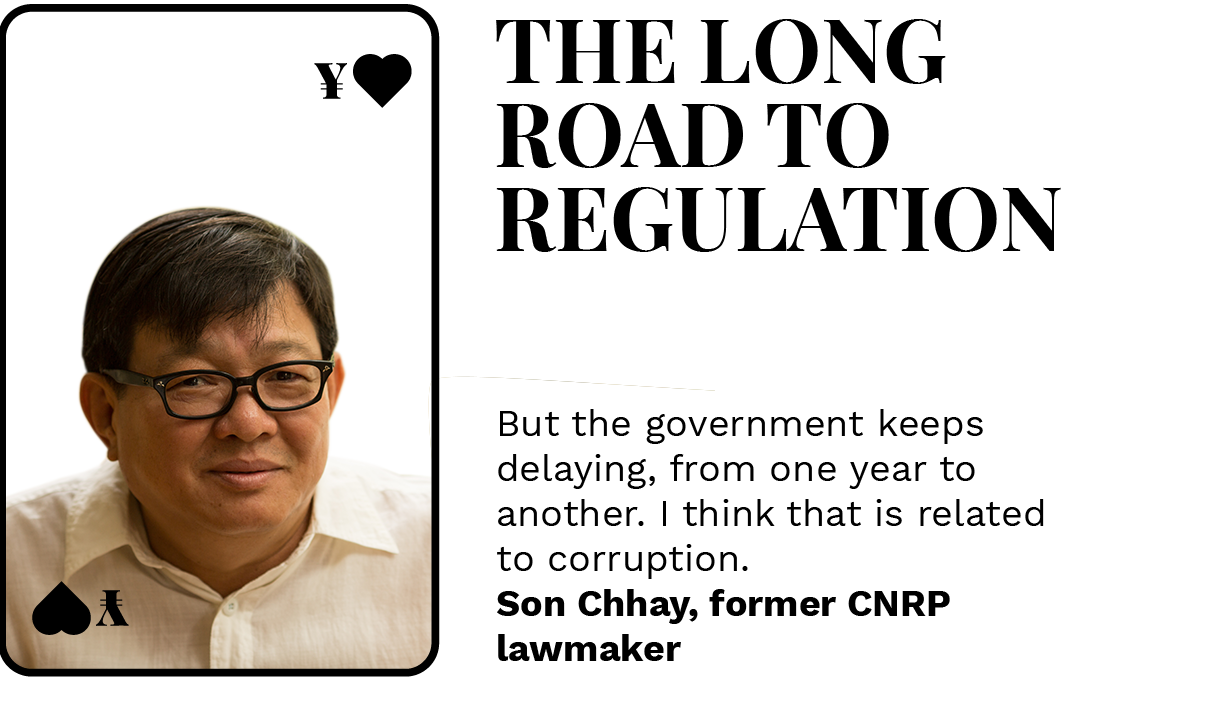
“Gambling on change,” reads the headline of a 2014 article in a local newspaper, announcing a gaming law expected to pass within the year. “Draft gaming law a step closer,” announces another outlet in 2016. “Draft gaming law to be approved”, yet another headline declares in 2017.
Two years ago, Phirun predicted that the gaming law would pass within the year. “There will not be delays [from now on]… for the approval of the draft law,” he told local news outlet Khmer Times. Now five years since its initial drafting, the tax law remains unpassed, and the MEF’s assurances of its imminent arrival have lost their potency.
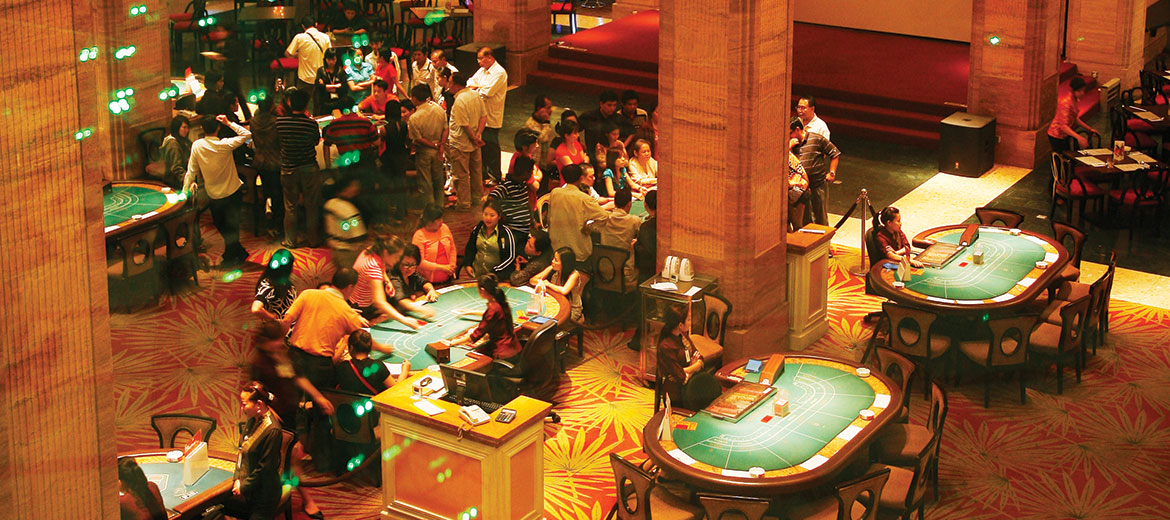
According to Son Chhay, a former lawmaker and member of the now-dissolved opposition Cambodia National Rescue Party (CNRP), the long-awaited tax law is slow in passing because “powerful people” in the government have a vested interest in the unregulated gaming industry. Whether the officials themselves have invested in local casinos or whether they simply enjoy the hefty bribes given them to keep the sector unregulated, he believes that graft lies at the heart of the continual delays to the tax law’s passing.
“We have asked the government to come up with the law for more than ten years already,” Chhay told Southeast Asia Globe. “But the government keeps delaying, from one year to another. I think that is related to corruption.”
Chhay was vocal about the need for a gaming tax law during his long tenure as an official, calling for casino regulation as early as 2002 – at which time he estimated that the then 15 casinos operating in the Kingdom would, if taxed properly, contribute up to $50 million in taxes annually.
Chhay held office through 2017, until he was forced out in the leadup to the contentious 2018 national election that saw the CNRP opposition party dissolved and Chhay – along with 117 other senior CNRP members – banned from political activity. Even during his years spent in office, Chhay said that despite repeated attempts, he never managed to see a draft of the gaming tax law. He still does not know what it covers.
“One of the reasons the government has delayed passing the law is that some casinos are affiliated with government officials’ personal businesses,” said Chhay in a recent interview. “Among them, there is NagaWorld.”
NagaCorp exists in its own legal sphere: with a 41-year monopoly on casino operations within 200 kilometres of the Phnom Penh city centre, the corporation will remain the sole casino operator in the capital until 2035, and has signed a 70-year license to continue operations in the city through 2065. In addition, NagaCorp has negotiated a tax structure for its casinos that – surprisingly – is in no way based on overall revenue generated, though the exact terms of the agreement have never been made clear.
“There are a lot of criteria in the [tax] agreement [with NagaWorld],” Phirun told local media in 2017, referring to the corporation’s golden casino complex that towers over the capital. “The agreement is written in a very thick book, so it is not easy to explain.”
The agreement, thick as it may be, has never been made public. And when the new gaming law goes into effect, NagaWorld will remain impervious to it, according to the MEF – the current agreement, which last year allowed NagaWorld to pay as little as a 0.63% effective tax rate on its GGR, will take precedence.
Even so, Chhay said he is hopeful that, when MEF officials say that the new gaming law will pass in 2020, they may be telling the truth. As more and more casinos set up shop in the Kingdom, the potential for significant profit has rapidly outpaced officials’ personal interests.
“I think that the reason for the government [trying to pass the new gaming law] now is that there are a lot of Chinese investments in Sihanoukville and along the border towns,” Chhay said. “The government sees that there are major foreign-owned casinos here, and they need to profit from this, so they are pressured to make this law.”
Chhay himself has made no secret of his distaste for casinos and gambling, which he believes are linked to a rise in drug and human trafficking. But if they’re going to exist in the country, he said, they can at least pay a fair amount in taxes.
“We do not know yet about how effectively the new law will be enforced,” he added, “But even so, this regulation should be promoted widely.”
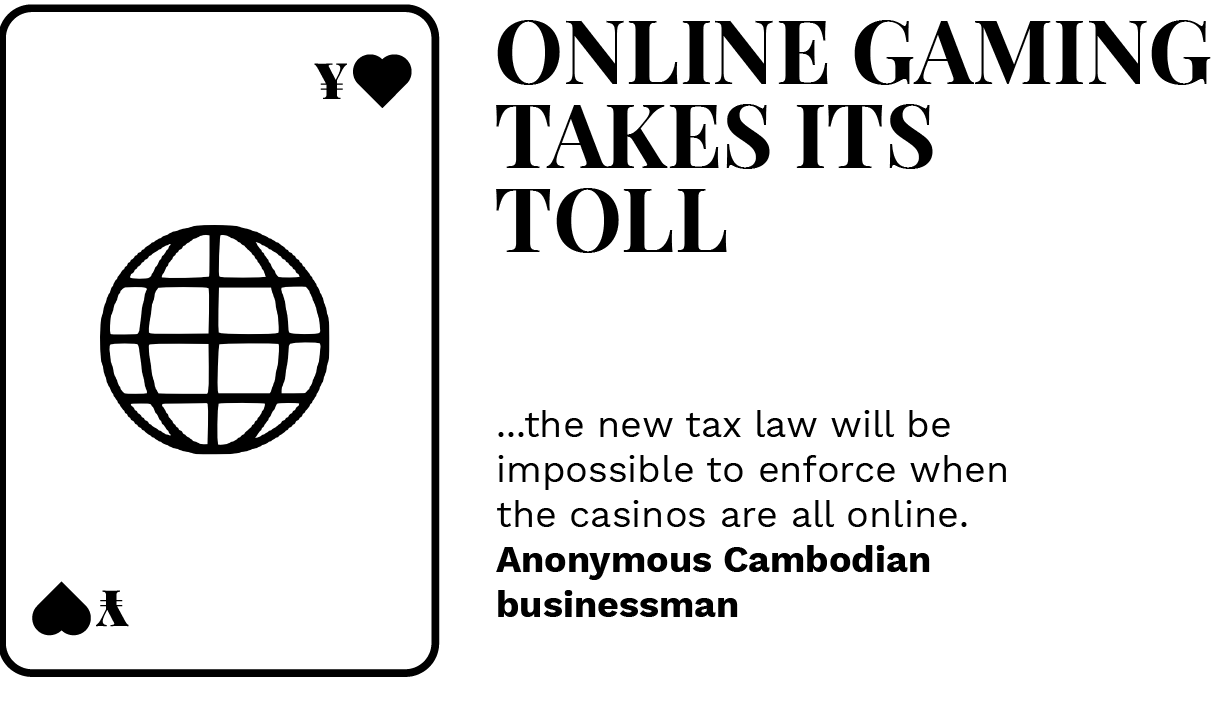
A Cambodian businessman slams his fist on the dark wood surface of his office coffee table, emphasising each word with an angry rap of his knuckles.
“It is not only about making new laws… the government does not know how to enforce the laws it already has,” he vented, speaking under the veil of anonymity to avoid potential backlash from government officials. “Frankly speaking, it is fine to accept business and investment from anyone, but when will the government walk the line and follow its own laws?”
He takes a deep breath.
“You think those casinos are hiring the local people? They’re not. And even more than that… all of these casinos are going online,” he added, fist again meeting table top. “And that is very worrying, because the new tax law will be impossible to enforce when the casinos are all online.”

“How exactly are we going to charge them on this digital revenue? And when we find we can’t, how will the government see the benefits of these many, many casinos, even after the law [goes into effect]?”
It is a point that few are willing to discuss: the casino industry may well be outpacing any potential regulatory legislation Cambodia is prepared to pass, adopting online gambling services that officials don’t yet have the tools to monitor.
Most online bets are placed in the form of cryptocurrency, which the Kingdom has yet to either officially recognise or outlaw, and which remains unregulated in the country. Cryptocurrency exchanges can be difficult to trace, and to do so would likely require Cambodia’s auditors to partner with a private crypto-tracking firm – a move that would be both expensive and seemingly at odds with the government’s official stance on the digital coin.
In Sihanoukville, only a few dozen players actually sit at the baccarat and blackjack tables that stretch across the cavernous room of the God of Wealth casino. As live hands are dealt, however, the dealers’ eyes dart between the players before them and the computer monitors set up to the right of each gaming station, where more bets are being placed.
Virtual gamers watch from cameras, playing as ghosts at each table, their presence made known only by the screens that show a running record of their wins and losses.
Down the street, at the La Vogue Boutique Hotel and Casino, the door greeter is all too proud to tell a potential gambler that two of the casino’s three floors are dedicated to online gaming. While a handful of players engage in a round of baccarat near the entryway to the casino, the majority of games on the floors above and below their table are able to be accessed virtually by players from around the world.
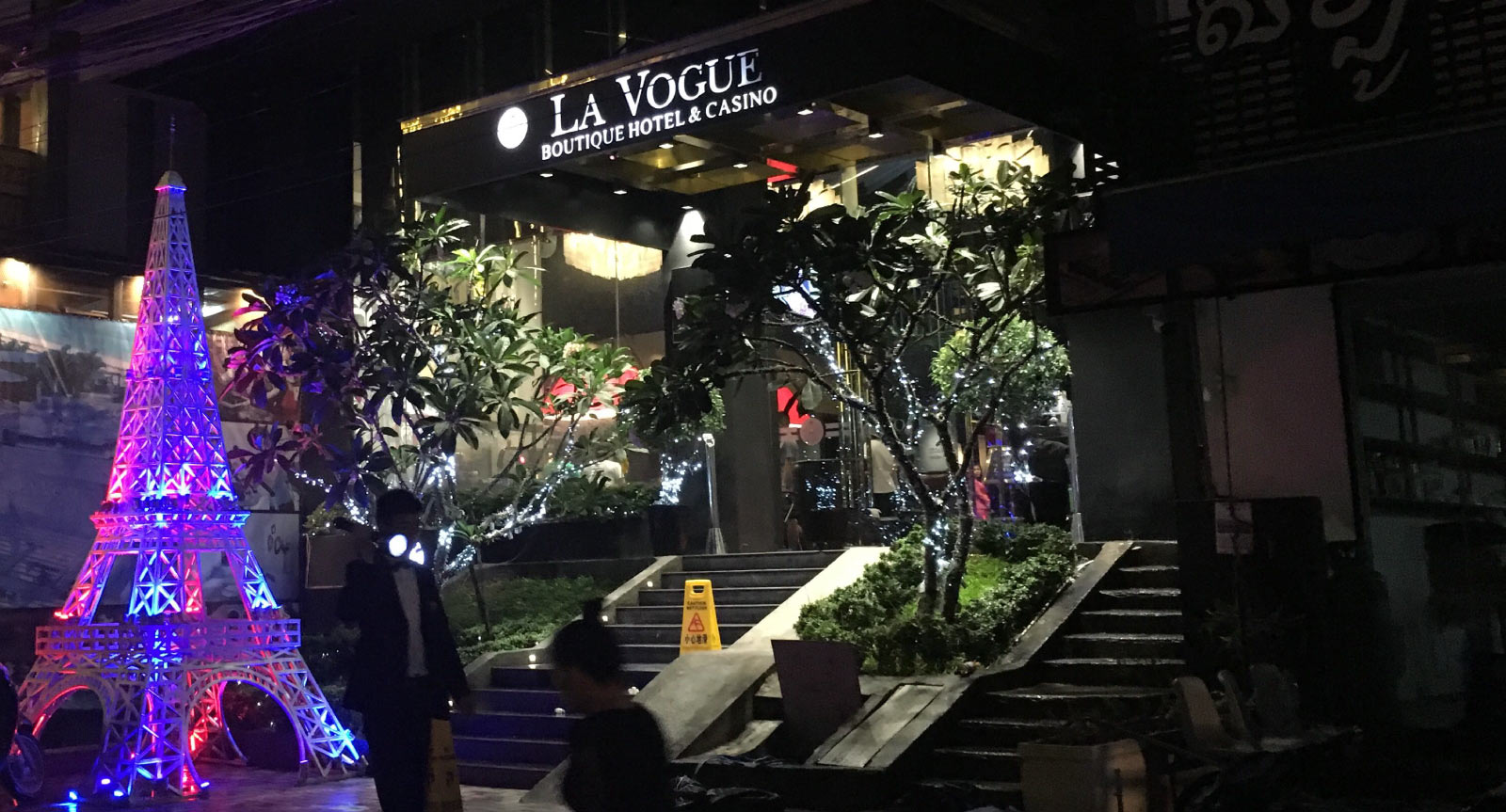
It’s an odd set-up, and one that is somewhat unique to the Kingdom, where gambling is outlawed for locals, but where foreign casinos are allowed to set up land-based operations that cater to foreign players. Online gambling in the country is technically legal – but only in land-based casinos, which pay a $10,000 licensing fee for the privilege.
Or rather, that was the plan. In reality, many casinos operate online gaming without purchasing any form of licence to do it. The MEF has reported that a total of 63 online gaming licenses have been issued, but according to online forums, the digital gaming fad has been embraced in some form or fashion by a vast majority of Cambodia’s casinos.
Some act in outright violation of the law; others choose to take advantage of the loose regulations to hire a licensed online casino operator who has the legal right to set up online gaming activity at any number of casinos. These licensed operators often provide the gaming website access, the hardware, and the training for established land casinos to begin incorporating online services.
According to a statement released in 2017 on gaming website Calvin Ayre, Cambodia’s loose regulation for online gaming licenses provides companies with immense opportunity for profit.
“Not only are online casinos fair game, but this online gaming license can be extended to other people wishing to use the casino license for their own platforms,” the statement reads. “Operators… will work under [the] umbrella [of a licensed online gaming entity], using their facilities and experience.”
“It opens Cambodia to the whole world,” the statement continues, “Allowing everyone to get started in iGaming – even those who are facing legal issues in their country.”
Asia Live Tech, which runs the Lucky Ruby Casino and Resort in Sihanoukville, is just such a licensed operator that has made a business out of providing online gaming services to established casinos in the Kingdom, with 30 casino partners listed on its website.
“Take advantage of our online gaming license in Cambodia!” it exults on its website, promising potential operators of one of its programmes that “91% of all operator’s revenue from your online casino or iGaming website will be yours to keep”.
That doesn’t leave much wiggle room for a revenue tax, and the fear is that the digital realm in which Asia Live Tech operates is one that is not going to be easily audited. While the land-based casinos see the financial benefit of the online gaming they offer, their online operations – which likely make up a majority of many casinos’ revenues, and which are typically paid for in unregulated cryptocurrency – are not as easy to validate, and require technical expertise to verify.
In a perfect world, every casino would honestly report its online gaming revenue to the government, giving officials the chance to tax it – but the world is far from perfect.
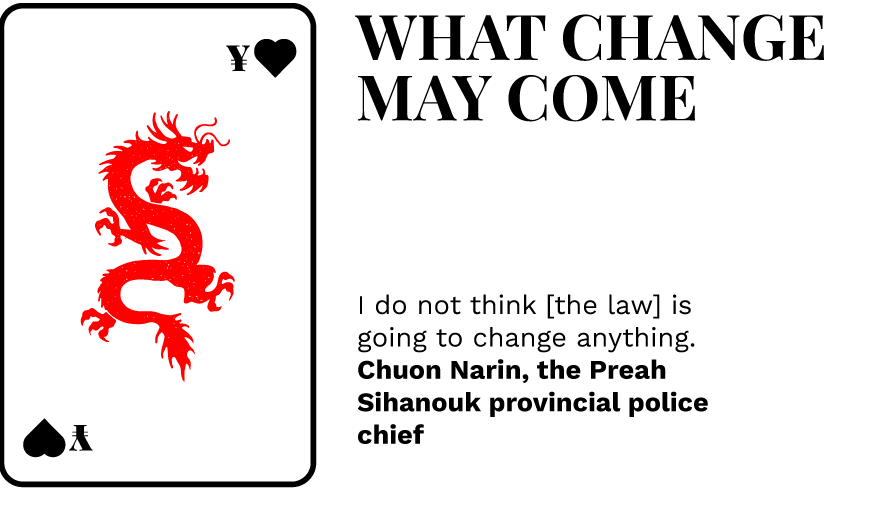
Phirun remains hopeful that the gaming tax law will see the reputation of Cambodia’s casinos change, encouraging more publicly listed companies to set up their businesses in the Kingdom.
There is reason to believe that, in some small way, it could. Representatives from Donaco, which operates the second largest casino chain in Cambodia, have stated before that they welcome the new law; even as they expect to have to pay more in taxes than they do currently, they say they look forward to operating in a more regulated sector and on a fairer playing field.
Of course, a fresh start can only be built through effective enforcement – if not of casinos’ online gaming, at least of their offline operations.


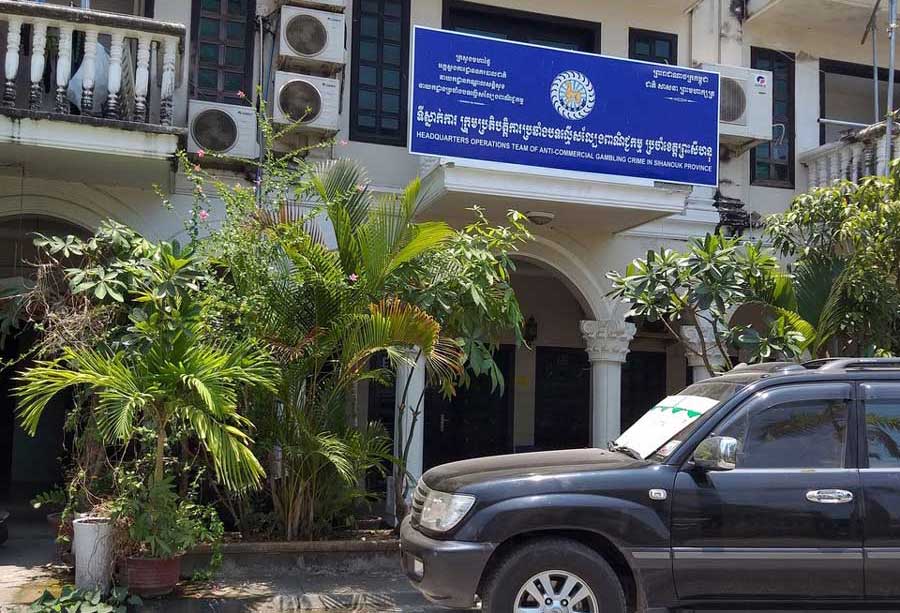
Below: The headquarters of the anti-commercial gambling police in Sihanoukville. Photos: Sihanoukville-Cambodia.com
Chuon Narin, the Preah Sihanouk provincial police chief, was uninterested in discussing the possibility that the new tax law may prove difficult to enforce.
“As law enforcers, we prefer to run things by the law,” he said in a recent phone interview. “Whether it impacts the business or not, law is still law.”
He did not comment on the rise of unlicensed casinos in Sihanoukville, which police have yet to effectively shut down, nor did he provide comment on how he planned to implement the new law.
But the police chief was surprisingly candid about his doubts that the new tax law would be able to make a difference.
“[Casino operators] are not intimidated by what the law requires them to do,” Narin said. “I do not think [the law] is going to change anything.”
But if ever Cambodia needed that change, it is now. Even if set at a low effective rate, the law could see Cambodia’s coffers swell at a time when the potential withdrawal of tariff-free trading agreements with the EU and the US could cost the Kingdom $676 million a year in trade.
The MEF has set its sights low for the new law, expecting only to double its current casino revenue upon its passing, according to Phirun. But the law would nonetheless be a step in the right direction, and could even help fund more effective law enforcement in popular gaming cities, leading in time to the licensing or closure of the country’s many shadow casinos.
But the law, when it comes, may well be too little, too late for the locals living in Cambodia’s new boom towns. Tensions in Sihanoukville are high, and a distaste for casinos and the gambling visitors they attract – the majority of which are Chinese – is hardening into hatred.
On a street crowded with Chinese tourists, local tuk tuk driver Nap gestures at a new Chinese restaurant being built alongside a string of newly made Chinese restaurants.
“Now Chinese, all Chinese, all coming for the many casinos,” he said, shaking his head.
“Law, no law. They don’t care, they keep their money,” he said. “We just want them to leave.”
Additional reporting by Thim Rachna


